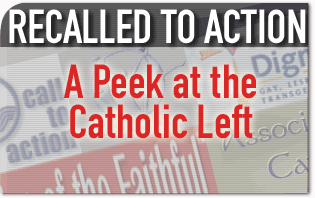 Hype and media coverage often give the impression that leftist organizations make up almost monolithic forces of change against which conservatives can do nothing. This is also true of the so-called progressive Catholic groups whose media projection of their influence and activities often distorts reality.
Hype and media coverage often give the impression that leftist organizations make up almost monolithic forces of change against which conservatives can do nothing. This is also true of the so-called progressive Catholic groups whose media projection of their influence and activities often distorts reality.
There are, however, times when leftist Catholics themselves speak out and one gets a real picture of what is happening inside their ranks.
Such is the case of Frances Kissling, the 25-year president of the misnamed Catholics for a Free Choice. The media has long made Miss Kissling the unofficial spokeswoman of pro-abortion advocates who call themselves Catholics. While her organization is often billed as the nation’s largest “Catholic” pro-choice organization, the entity has no Catholic recognition, no membership and is funded almost entirely by wealthy pro-choice foundations.
Parting remarks
Miss Kissling just stepped down from the $200,000 a year post to pursue studies elsewhere. In parting remarks to the National Catholic Reporter’s Joe Feuerherd, she lambasted the Catholic left with undeniable frankness.1
While acknowledging the “viciousness” of certain periodicals and organizations of the Catholic right, Miss Kissling was none too generous with her fellow “Catholic” progressives. Whether considered as reform movements within the Church or mere political forces, she rated them as “nonentities.”
Among the first liberal group to fall under her criticism was the Boston-based Voice of the Faithful, founded five years ago amid the sexual abuse scandals. Miss Kissling reported that the now toothless organization, which had the ideal mobilizing issue, has simply not succeeded in mobilizing Catholics, suffers from ever-falling donations and claims questionable active membership numbers.
Other liberal organizations fared no better. Despite the fact that the mainstream media constantly rushes to them for commentary and dissident opinions, Miss Kissling concluded that the “rest of us, Call to Action, ARCC [the Association for the Rights of Catholics in the Church], Dignity, the Women’s Ordination Conference” are so small in number and influence as to question whether a movement even exists.
Betraying Principles
Part of the problem, it seems, is what Miss Kissling claimed is the progressive religious community’s efforts to ingratiate itself with the Democratic Party to the detriment of its radical principles.
She noted that progressive Catholics, for example, have long discarded Christian symbols and religious habits as relics of the past and yet they are often asked to vest themselves in these symbols of respectability and credibility to get their message across.
Miss Kissling complains that no one calls for the most radical theologian to get a story. “They call and say, ‘Do you have a nun who still wears a habit who can show up at my press conference [or] can you send me a collar?’” in obvious reference to a priest in his clerics.
She decried a kind of hypocrisy and “lying” among many Catholic progressives who, while personally being pro-abortion, simply will not admit it publicly out of fear of being marginalized by the hierarchy and parishes with which they work.
For someone who has worked in the field for so long, she has not much to show for her efforts. She believes the Supreme Court will overturn Roe v. Wade or abortion will be eviscerated to the point where it will be sent back to the states. Her future studies will try to find “common ground” between proponents and opponents of the gruesome abortion practice.
Surprisingly, her successor as champion of the woman’s “right” to abortion will not even be a woman. Irish-born executive vice president Jon O’Brien has taken her place as new president.
Jumpstarting a Movement
Miss Kissling is not alone in her commentary. Other Catholic “progressives” sense a similar lack of direction or progress. At the thirtieth anniversary of Call to Action National Conference last November, Sister Joan Chittister O.S.B. delivered the keynote address which was almost a State of the Union address for the Catholic left.
The reoccurring theme was the admonition that things are not as bad as they seem. Things could be worse. The outspoken sister proposed a “spirituality for beginning again” to jump start the lagging movement.
To encourage the ever-more-graying crowd of aging progressive faithful, the outspoken sister cited a far-from-encouraging story of a Zen master who was asked where enlightenment might be found. The master told the disciple that “if you want to know if your work is accomplished and you are still alive, it isn’t.”2
Such peeks into the “progressive” Catholic left serve to highlight the reality of their weakness and lack of popular appeal and dynamism. It should serve to expose the lack of substance behind the media reports that cite leftists as spokesmen for the Church. Finally, it should serve to encourage Catholics to hold firm to the Faith and continue to fight for Catholic morals and doctrine so often attacked by today’s secular society.

